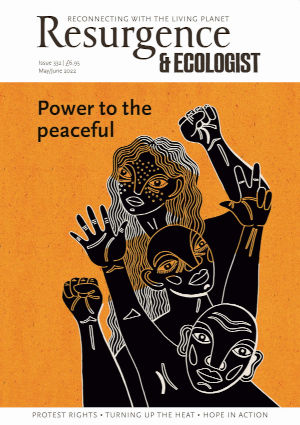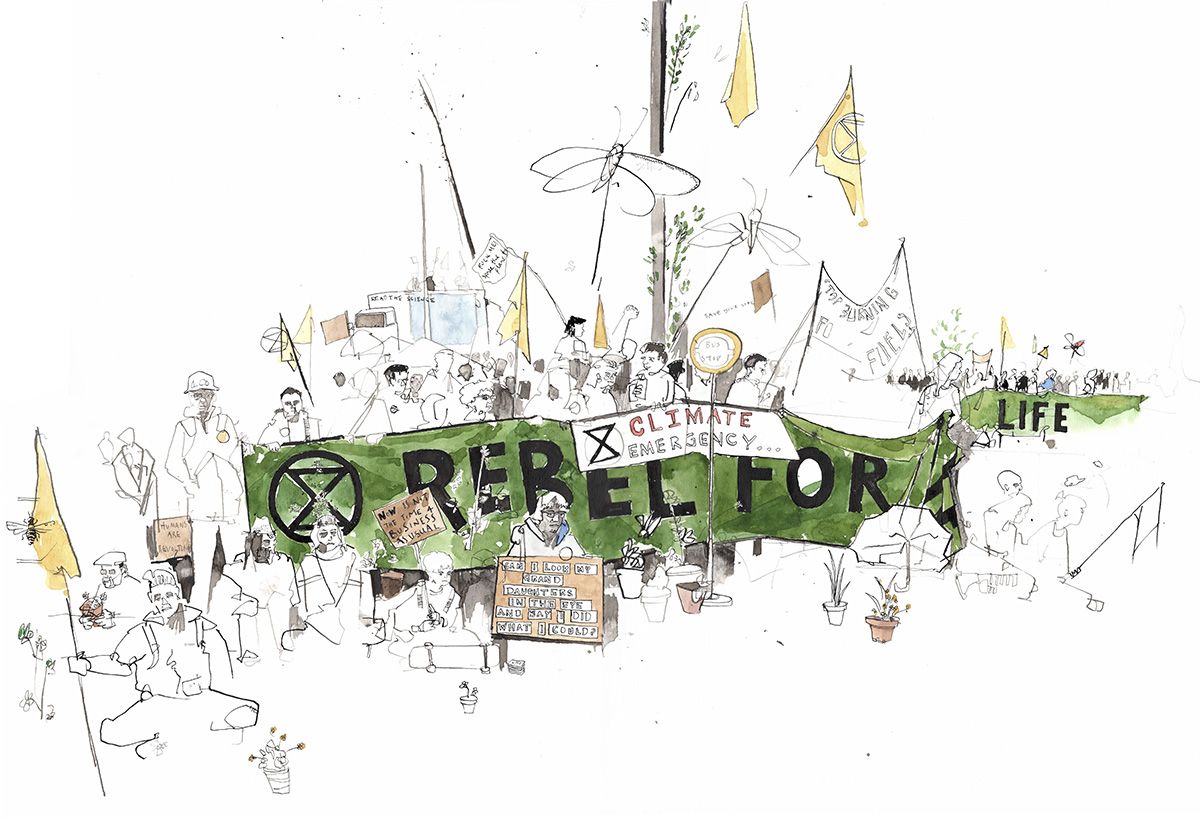The future that confronts younger generations seems extremely perilous, with the climate crisis already upon us while fossil fuel burning increases globally. Older generations compound this injustice by suggesting that it is the young who must surrender their youth to campaigning for climate action. Barack Obama, once ‘leader of the free world’, famously said: “To all the young people out there – I want you to stay angry. I want you to stay frustrated… Gird yourself for a marathon, not a sprint.”
And in this very moment Boris Johnson and his Conservative government have decided to introduce the Police, Crime, Sentencing and Courts Bill. So young people now have to gird themselves for a spell in prison if they take part in the most basic forms of climate protest. People now have to sacrifice time that should be spent learning, or hanging out, to protest for the right to protest for a future without being arrested and thrown into prison. This is a triple injustice.
David Renton is a practising barrister and the author of the forthcoming book Against the Law (Repeater, 2022). He described some of the absurdities of the Policing Bill (as it has become known) in an article for The Ecologist online, and his arguments were picked up when the proposed legislation was in the House of Lords. We went back to him and asked, is the bill as bad as it seems?
“This is a huge bill. It is 300 pages long and has sections dealing with such diverse topics such as traffic, youth justice and the removal of information from electronic devices,” he told Resurgence & Ecologist. “One of its effects will be to change the policing of protests more dramatically than any other legislation for decades.”
Recently I had a private conversation with a senior police officer serving with the Metropolitan Police. He told me that dealing with Extinction Rebellion (XR) protesters who had been arrested was the easiest work he had done since joining the force and that there were already ample powers to deal with protests. Indeed, the police policing the protesters against the Policing Bill in Bristol a few months ago were conspicuous by their absence. So, you have to ask, do frontline police officers need or want these new legal powers?
Renton makes a similar observation. “Few police officers have called for these extra powers. A number of senior officers, most of them retired, have actually spoken out against the bill. The sense is that this is all about politicians wanting to be seen to look tough, and courting our right-wing press.
“Some right-wing MPs have also spoken out against the bill. What they dislike is that it gives the police enhanced powers to cancel protests on grounds including that assemblies might cause noise or disruption to their intended targets. It is obvious that the next time people plan to protest outside the headquarters of BP or Exxon, that business will contact the police and ask for the protest to be banned. Agreeing to do so carries a risk to the police, in that they will be seen as taking sides and get dragged into political debate. It is that prospect that worries even some politicians who see themselves as on the police’s side.”
The Policing Bill would make it unlawful for protesters to block newspaper printing presses. It is no coincidence that this proposed criminalisation of protest follows an action by XR outside the presses of newspapers owned by Rupert Murdoch, who has for decades enjoyed significant influence over prime ministers and their governments. Is this evidence that XR protests that strategically target corporations are having a serious impact, that feathers are being ruffled?
“Parts of the bill are intended to make protest impossible,” Renton responds. “For example, in the House of Lords, the government tried to rewrite the legislation to make it unlawful for a protester to attach themself to “another person, to an object or to land”. Undoubtedly this clause was included to punish environmental protesters locking on to a static object to make it harder for the police to arrest them. That particular clause was defeated in the Lords, but the government is expected to try again to pass it.
“The pattern with all previous legislation has been that, once the contents of an authoritarian bill are widely known, protesters innovate – they come up with new tactics to get around an apparent ban. My hope is that, whatever form of the bill passes, that cycle of innovation will continue. But, at least for a while, protest will be much harder.”
There is an almost all-encompassing feeling that, as the impacts of climate breakdown worsen, and the need for action becomes clearer, governments around the world are responding by becoming more authoritarian. But is this feeling really supported by the facts? Renton is an expert on authoritarian regimes, both past and present. What can he tell us?
“A number of countries have elected leaders in the past decade who show clear authoritarian sensibilities – the likes of Trump, Modi, Bolsonaro. All over eastern Europe we have seen relatively liberal societies fall into forms of managed democracy, where opposition parties have few rights and protests are criminalised.
“The government here in the UK has been trying to expand its powers by taking over public bodies and replacing their leaders with government loyalists. We have seen that at the BBC, in the Equality and Human Rights Commission, and elsewhere. There is also an alarming trend of the government making ever-greater use of ‘secondary legislation’ – powers to legislate without parliamentary scrutiny.”
Finally, then, what should our response to the Police Bill be? Will protesting the right to protest alienate the public, and drain significant resources away from other campaigning? Do we have any choice?
Renton concludes, “If we don’t campaign in support of protest rights, we will lose them. There is nothing in principle to stop Britain becoming a new Poland or a new Hungary. What stops that threat is when people make use of their rights – whether that be jurors standing up against political prosecutions, or ordinary citizens taking to the street.”







